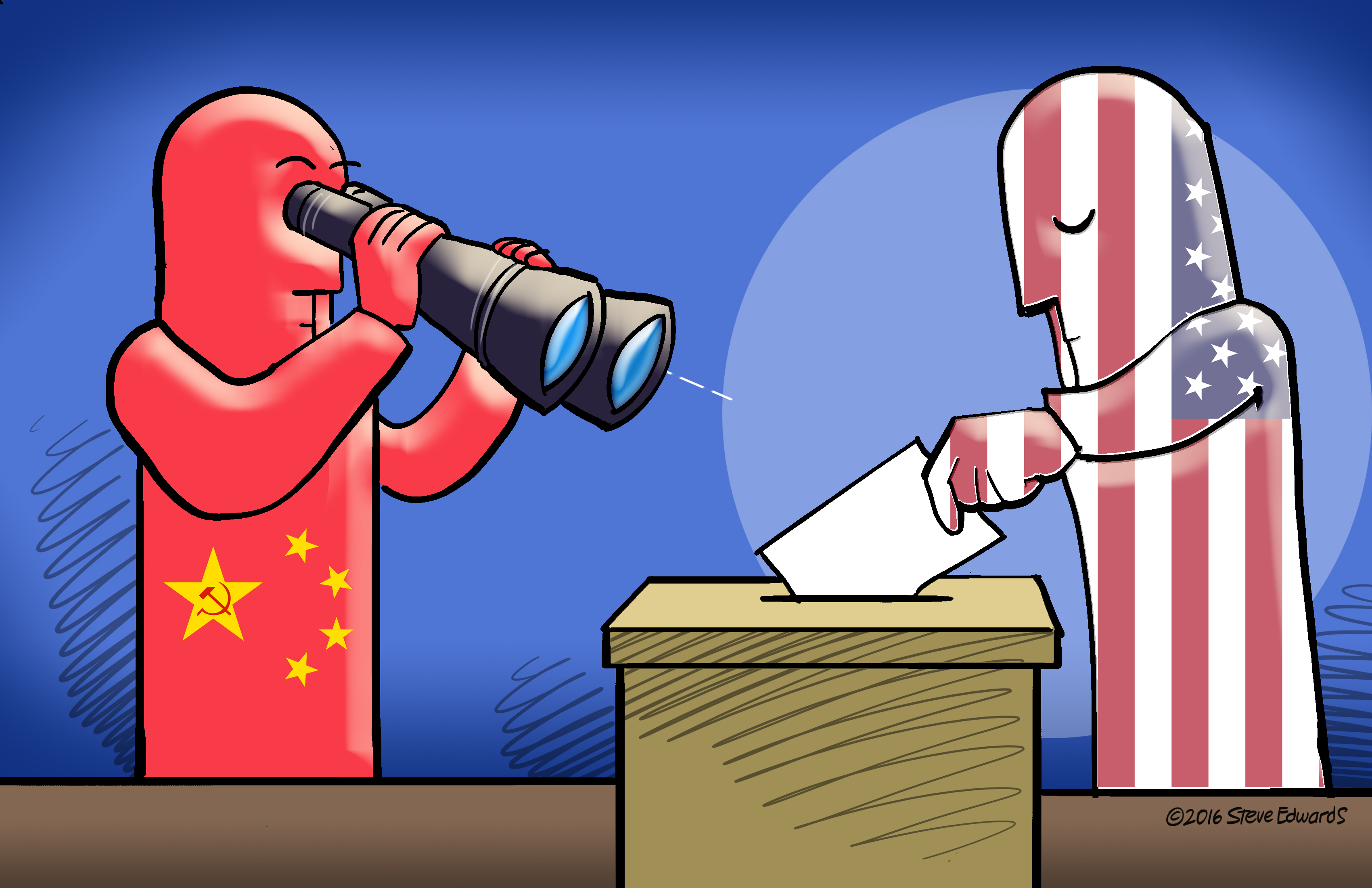The New York Times posts a cartoon of China enjoying the boxing battle among U.S. presidential candidates with popcorn, and says, “The Chinese Communist Party uses every presidential election to excoriate American democracy for its failings.”
(http://www.nytimes.com/2016/10/17/opinion/heng-on-china-and-the-us-election.html )
This is the typical tone U.S. media employ when talking about China’s attitude on any negative news in the U.S. However, an editorial in the state-run Xinhua News Agency seems to prove such an analogy. This editorial compares the three presidential debates to a boxing contest: “The three debates are more intense than real boxing match: Boxers would shake hands or hug their opponents after fierce battle; but the two presidential candidates refused to shake hands in the final debate. One of them even asked for ‘a dope test’ before debate.” The editorial concludes, “the presidential election is nothing but entertainment, which again implies ‘the failure of the American political system.’”
Xinhua News Agency set up a page of special reports on the U.S. presidential election and published several editorials after the final debate. In another editorial titled “The final debate sets a new records for the U.S. election, and slaps the American style of democracy,” the author quotes several Twitter users who criticize both Clinton and Trump, and says these voters reveal the dilemma the U.S. faces now, claimed to be the “largest democratic country in the world.” “This leads to a question: Is the election, of which the Americans are so proud of, not so serious? Audiences are getting more confused and helpless, the democracy that the U.S. is proud of has been tarnished.” (http://news.xinhuanet.com/world/2016-10/21/c_1119763141.htm)
The editorial continues, saying the meaning of the election is to help solve severe problems of a country’s development, and that the long and complex campaign and competition between candidates should be the chance to expose the political defect and address racial and social issues. However, the campaign and debate policy Donald Trump and Hillary Clinton employ does not solve problems. Instead, the candidates attack one another’s past mistakes and manage to destroy each other’s public image.
The editorial lists the U.S. media’s reaction to Trump’s statement of only accepting the election results if he wins, and says, “Finally, even Trump began to question the election result. This slaps on the face of American political system based on their claimed democracy, and casts doubt on the effect of American-style democracy.”
The editorial concludes, “The U.S. has considered itself as the role-model of Western democracy. Now it is time for introspection.” (http://news.xinhuanet.com/world/2016-10/21/c_135769827.htm)
Similar arguments appear in other Chinese media. People’s Daily, an official newspaper of the Chinese Communist Party, says the American political system is not welcomed by the U.S. public, and thus faces a crisis of legitimacy.
Even though these editorials criticize the U.S. democracy harshly as the New York Times points out, most news reporting of media in China on the election and debates is fact based or based on news from Western countries. Chinese media generally show no preference for either candidate.
However, one exception is an article on Sohu, a commercial media website.
This article, “The ugly battle of the U.S. election, China is more concerned if this candidate wins,” says the Chinese public has treated Trump as mere entertainment from the very beginning, but that there are more people starting to like him. While the Chinese public does not know Trump very well, there is an unfavorable impression of Hillary Clinton due to her tough past policies against Beijing. From the Chinese perspective, if she becomes the president, the U.S. foreign policy against China would be worse than that of Trump.
Attacking the American political system directly is not always the theme of China’s news reports on the U.S. election. An article of Xinhua News Agency compares the election to the TV drama House of Cards, which is very popular in China. Xinhua argues that the election is very similar to the TV drama plot.
The New York Times published an interview with You Tian Long, a Chinese doctoral student majoring in justice studies at Arizona State University at an earlier time to reject such association. You said in that interview that American politics is so complicated for Chinese people to understand that they use the TV drama as a “shortcut” to learn.
One can only speculate: Either the reporter and editor of Xinhua News Agency did not read the New York Times article, or they are taking a shortcut to appeal to the political knowledge of the Chinese readers.

Thank you for your sharing. I am worried that I lack creative ideas. It is your article that makes me full of hope. Thank you. But, I have a question, can you help me?
Can you be more specific about the content of your article? After reading it, I still have some doubts. Hope you can help me. https://www.binance.com/ru-UA/join?ref=DB40ITMB